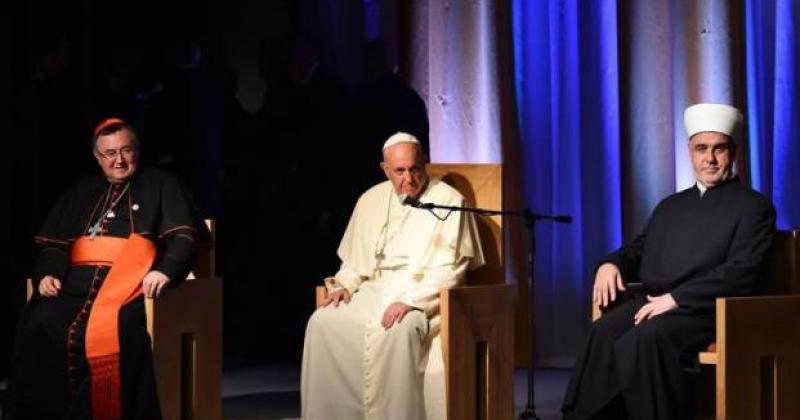During Pope Francis’ meeting with representatives of other religions, the imam spoke about the “genocide” of Muslims during the war, the Orthodox representative expressed “shame” about Christians who kill.
Sarajevo, “which in the recent past sadly became a symbol of war and destruction, today, with its variety of peoples, cultures and religions, can become again a sign of unity, a place in which diversity does not represent a threat but rather a resource, an opportunity to grow together.” Francis pronounced these words in his address to representatives of other faiths – Orthodoxy, Islam and Judaism – whom he met during the course of his visit to the capital of Bosnia-Herzegovina. None of those who spoke hid the difficulties that culminated in the war which turned the country into a bloodbath between 1992 and 1995. Francis listened attentively to all of these testimonies and concluded the meeting with a prayer that is common to all religions.
“Today’s meeting,” said the Pope who spoke in Italian, with simultaneous interpretater translating in real time, “is a sign of our shared desire for fraternity and peace; it is a testimony to the friendship and cooperation that has been developing over the years and which you already experience daily. To be present here today is already a “message” of that dialogue which everyone seeks and strives for.”
Francis recalled that the local Council for Interreligious Dialogue was born after “the war, in response to the need for reconciliation and rebuilding a society torn apart by conflict”. “Interreligious dialogue,” the Pope underlined, “before being a discussion of the main themes of faith, is a “conversation about human existence” and cannot be limited merely to the few, to leaders of religious communities, but must also extend as far as possible to all believers, engaging the different sectors of civil society. Particular attention must be paid to young men and women who are called to build the future of this country,” Francis said. He pointed out that in order for dialogue “to be authentic and effective, it presupposes a solid identity: without an established identity, dialogue is of no use or even harmful.”
“We are all aware that there is a long way yet to go,” the Pope said. “Let us not be discouraged, however, by the difficulties, but rather continue with perseverance along the way of forgiveness and reconciliation. While we seek to recall the past with honesty, thereby learning the lessons of history, we must also avoid lamentation and recrimination, letting ourselves instead be purified by God who gives us the present and the future: he is our future, he is the ultimate source of peace.” “This city, which in the recent past sadly became a symbol of war and destruction,” Francis continued, “today, with its variety of peoples, cultures and religions, can become again a sign of unity, a place in which diversity does not represent a threat but rather a resource, an opportunity to grow together. In a world unfortunately rent by conflicts, this land can become a message: attesting that it is possible to live together side by side, in diversity but rooted in a common humanity, building together a future of peace and brotherhood.”
The Pope concluded by inviting the approximately 300 people present – who stood up – to join together in reciting a prayer to God, to the “Almighty and eternal God, good and merciful Father”, “God of Abraham, God of Isaac, God of Jacob, King and Lord of the past, of the present and of the future; sole judge of every man and woman”. Francis prayed “for this country, Bosnia and Herzegovina, that men and women, followers of different religions, nations and cultures may live here in peace and harmony”.
The Cardinal of Sarajevo, Vinko Pulic, introduced the ecumenical and interreligious meeting in the international Franciscan student centre. The cardinal assured the Churc’s commitment to a necessary dialogue in a context in which “many wounds still need to be healed before trust can be restored”.
Bosnia-Herzegovina’s religious and cultural traditions “are part of one European heritage that is nevertheless a tormented heritage,” the Muslim representative Husein Kavazovic said. “All ambiguities and controversies surrounding Europe’s identity reflects directly on Bosnia-Herzegovina. The Bosnian Muslim genocide forces us to re-examine our faith and mission,” meanwhile, it seems that for faithful, it has become more important to back respective political, military and economic blocs, instead of testifying the Truth and helping people, not with power but with love and comfort.” The Orthodox bishop, Vladika Grigorjie, stated: “Twenty years ago, thanks be to God, we came out of the last war (but even previous wars did not spare us, leaving behind deep wounds that have not yet healed) and we still speak about it as though it ended yesterday. This is understandable because wars bring adversity, murders and acts of cruelty against the smallest and the innocent, always; all parties in a conflict have assassins and victims. But as children of God’s Church, we especially should be concerned and full of shame about the fact that, here in our country, Christians have killed Christians as well as non-Christians; as a result, graves, grottoes, churches and crumbling monasteries have filled this country since the end of the Second World War..” The president of the Jewish community, Jakob Finci said: “We do not wish to lie to you because we are not politicians, telling you that things are all rosy here and that there are no problems. There are problems, but we are trying to resolve these together, in the awareness that survival in this wonderful corner of the earth, which God has given us to use, is only possible if we work together.”
